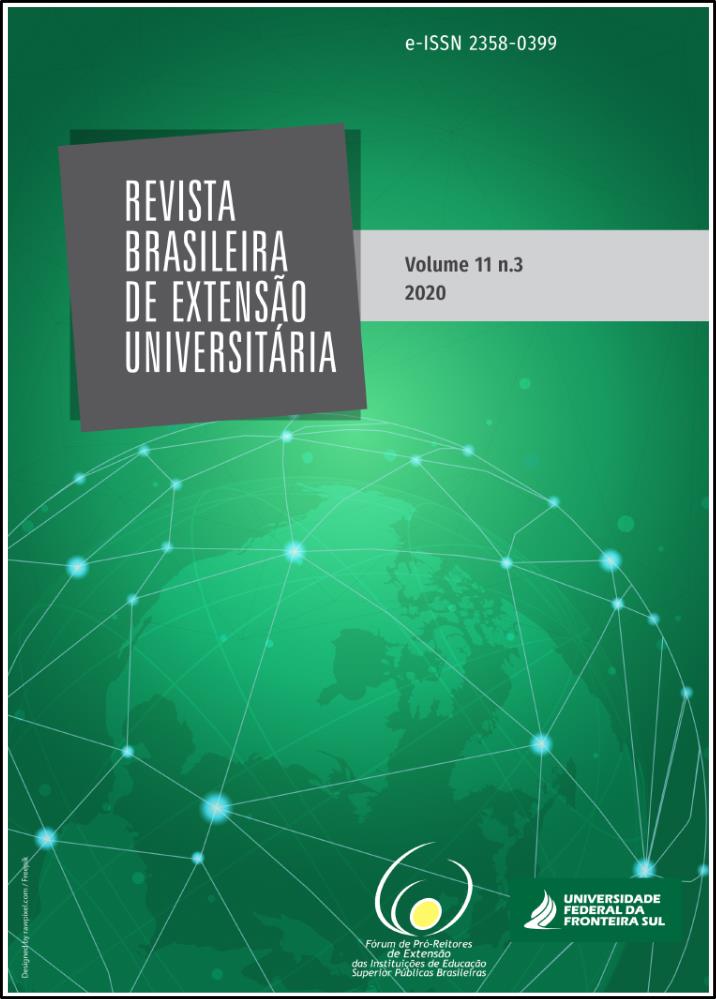Medicina veterinária e a saúde única: Ação socioeducativa aplicada a idosos no contexto da COVID-19
DOI:
https://doi.org/10.36661/2358-0399.2020v11i3.11560Palavras-chave:
Educação, Epidemia, Grupo vulnerável, Promoção de saúdeResumo
A saúde única integra as esferas da saúde humana, ambiental e animal, por meio de políticas públicas focadas na prevenção e controle de enfermidades infecciosas. O médico veterinário é um profissional atuante na área da saúde pública pelo contato direto com as três esferas, e uma das principais ações desse profissional inclui a promoção de medidas comunitárias educativas para disseminar informações em relação à prevenção de doenças zoonóticas. Diante da atual pandemia, desenvolvemos o projeto: “Efeito borboleta aplicado a asilos de Uberlândia-MG no combate à COVID-19” com o objetivo de divulgar informações sobre a doença de maneira lúdica, e atender as demandas das instituições envolvidas. Foram produzidos e distribuídos dez materiais didáticos como vídeos e jogos interativos com orientações em relação à COVID-19 em 16 abrigos de idosos, junto à arrecadação de produtos de limpeza e higiene pessoal, máscaras e gêneros alimentícios, para enfatizar as medidas preventivas, provenientes de doações de 23 empresas. Funcionários das instituições desenvolveram as atividades propostas com os idosos, ressaltando a importância do distanciamento social e da higiene pessoal no momento atual. A ação executada permitiu a ampliação do conhecimento a respeito da pandemia, em virtude do uso de metodologias aplicadas às dificuldades e necessidades dos idosos, aliada à motivação emocional utilizada na proposta, o que favoreceu o processo ensino-aprendizagem. A presente ação social nas instituições auxiliou na conscientização e esclarecimento de dúvidas em relação à COVID-19 ao principal grupo de risco, e reforçou o contexto de atuação do médico veterinário na saúde única.
Palavras-chave: Educação; Epidemia; Grupo vulnerável; Promoção de saúde
Veterinary medicine and the one health system: socio-educational action applied to elderly in the context of COVID-19
Abstract: The one health system integrates the human, environmental, and animal health spheres through public policies focused on preventing and controlling infectious diseases. The veterinary doctor is a professional actor in public health through direct contact with the three spheres. One of these professional's main actions includes promoting community educational measures to disseminate information regarding the prevention of zoonotic diseases. In the face of the current pandemic, we developed the project: "Butterfly effect applied to asylums of Uberlândia, Minas Gerais State, Brazil, in the combat to COVID-19" to spread information about the disease playfully and to attend to the demands of the involved institutions. Ten educational materials were produced and distributed, such as videos and interactive games with guidelines regarding COVID-19, in 16 shelters for the elderly, along with the collection of cleaning and personal hygiene products, masks, and food products from donations from 23 companies, to emphasize preventive measures. Institutional staff developed the proposed activities with the elderly, emphasizing the importance of social distance and personal hygiene at this time. The action performed allowed the amplification of knowledge about the pandemic due to the use of methodologies applied to the difficulties and needs of the elderly, allied to the emotional motivation used in the proposal, which favored the teaching-learning process. This social action in the institutions helped to raise awareness and clarify doubts concerning VOCID-19 to the leading risk group and reinforced the context of the veterinarian's action in the one health.
Keywords: Education; Epidemic; Vulnerable group; Health promotion
Downloads
Downloads
Publicado
Edição
Seção
Licença
Autores que publicam nesta revista concordam com os seguintes termos:
- Autores mantém os direitos autorais e concedem à revista o direito de primeira publicação, com o trabalho simultaneamente licenciado sob a Creative Commons Attribution 4.0 que permite o compartilhamento do trabalho com reconhecimento da autoria e publicação inicial nesta revista.
- Autores têm autorização para assumir contratos adicionais separadamente, para distribuição não-exclusiva da versão do trabalho publicada nesta revista (ex.: publicar em repositório institucional ou como capítulo de livro), com reconhecimento de autoria e publicação inicial nesta revista
- Autores têm permissão de distribuir seu trabalho online (ex.: em repositórios institucionais ou na sua página pessoal) a qualquer ponto antes ou durante o processo editorial, já que isso pode gerar alterações produtivas, bem como aumentar o impacto e a citação do trabalho publicado (Veja O Efeito do Acesso Livre).




